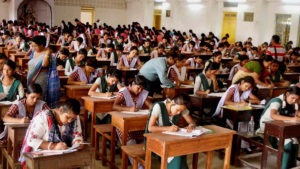Parental pressure to secure good marks and thereby ensure a ‘good’ life takes a heavy toll on teenagers who may have extra-curricular passions. How to strike a balance?
When asked about their successes, interests and hobbies, an incessant barrage of words is likely to pour out of these teenagers. Like Oscar winners, they reel off facts and figures about what they studied and how many tutors they had, who they would like to thank and what they are grateful for.
The teenage wizards who score exceedingly well in their Board exams assume a serious demeanour to rival any adult’s. They have spent at least two years focused 100% on academics, drowning in a sea of notes, textbooks and tuitions.

But what of their personal growth? Are we robbing them of the joys of childhood by expecting exceptional results from them? Are they taking on more than they should be expected to handle?
Patriot speaks to a few students, teachers, and ‘poor scorers’, to find out what, besides academics, makes them tick. Is the world around them conducive to their holistic development?
“I always wanted to become a dancer and pursue my hobby as a career,” recounts Diva Shukla, now 25, working for a multinational in Noida. “I still remember the day when I walked up to my parents with a form for Shiamak Dawar’s dance class and my father said, ‘What will you do after learning dance? How will this help you in the future? You should focus on your studies. Board year is crucial.’”

She agrees that this is the mindset of most parents. “And are they really to be blamed when the Indian education system has such loopholes?” she asks.
Diva did manage to secure a whopping 97% in her Class 12 Board examinations but she had to sacrifice her dream at the altar of academic achievement. “Maybe I would have been in a better position or at least happier had I taken my love for dance to the next level and actively pursued it. This does not mean that the efforts of students who work hard and get good marks goes in vain. Many are able to get admission into a good college because of it and then a well-paying job. But I believe that we must strive to strike a balance between our hobbies and academics. Never sacrifice one for the other,” she adds.
Is the Indian education system amenable to allowing scope for hobbies? Do parents and teachers actually encourage children to take up a hobby and to actively engage in it? Does academic pressure become a roadblock for students who want to participate in extra-curricular activities? The question of the hour is whether or not academic excellence alone is sufficient for overall personality development.
How many students actually have to put their hobbies and passions aside due to focus on scoring good marks at school?

Suyashi Singhal from Delhi Public School, RK Puram, is one such student from the science stream who made the choice to shift priorities. She obtained 97.8% marks — but only after sacrificing personal proclivities.
She used to be an avid reader and was also involved in dramatics, until juggling between studies and her hobby became tough. “I used to read a lot, but it gets so hectic for us in Class 12 that it became really difficult to manage what I loved doing with academics. A lot of our time goes into studying and we are not really left with much time to do anything else, especially those students who attend coaching after school,” she says.
Suyashi also used to actively take part in dramatics and debate competitions, but “it was my choice to focus on academics, instead of such co-curricular activities in Class 12,” she says, adding, “I think it varies from person to person and depends on our priorities.”
However, she does feel that academic learning is not sufficient for overall personality development, “I think just academics are not enough, we must also know how to communicate with people. Taking part in co-curricular activities also creates a good impression on our resume and in the long run, many recruiters focus on the kind of activities we took part in school.”
Ella Birkett, an HR executive, says, “It is true that co-curricular activities even go a long way in polishing your resume and during interviews, it does increase one’s chance of being selected — from how you present yourself to the hobbies that you actively engage in, every aspect of your personality is taken into consideration while hiring you.”
“Nowadays, many students are able to get good marks — not to deny that a lot of hard work goes into getting such marks — but they become too academic-oriented, so much so that they study round the clock without taking part in any other leisure activity. This also ends up affecting their mental health, as they start expecting too much from themselves. In the end, if they are not able to attain the desired results, they get disappointed and shattered,” says Bina Kalra, a psychology teacher.

Hobbies promote the development of a well-rounded personality. But the pressure of Board examinations often deprives students of the opportunity to participate in co-curricular activities. Some find their routine too hectic to indulge in any such activity, some willingly choose to focus on studies as they are scared messing up their academic performance and some end up giving on their hobbies because of their parents’ objection. Many students are inclined more towards extra-curricular activities and have talents that they want to turn into a career. But not everyone is able polish these skills because academics become an obstacle.
This is despite the well-known fact that many students do well in life even if they did not obtain good marks in their Board examinations. “Studies should never be a deterrent,” says Akshay Narayan, a 27-year-old who has a well-paying job in the corporate sector now. “We all should have the choice of doing what we truly want to do because everyone’s aptitude is different. Our hobbies help us discover what we truly like doing.”
“I was always an average student in school, but I ended up getting an extremely good work opportunity. I am no longer ashamed in saying that I got just 60% in my Board examination. Marks are important, but they cannot entirely and solely chart out your career path. A lot depends on your potential, which marks cannot determine,” he adds.

Eshika Gupta, class 10 topper from Delhi Public School, RK Puram was pleasantly surprised at her own Boards results. “Even I’m astonished!” exclaims the 16-year-old, when congratulated on topping the Boards. She scored a whopping 99.2% and had apparently not been expecting to get 100 in anything other than her favourite subjects — Math and French.
“I was literally shaking when I saw the results at 3 o’ clock,” she recounts. Never having taken any tuitions, unlike many her age, Eshika maintains that studying too much is only counter-productive. “The mind gets blocked after a point,” she explains. “Even if you’re looking at the words, you aren’t really registering them. And that’s just a waste of time.”
Eshika is a dancer and has been since she was six. At a dance academy down the street from her home, she recently won an award for her performance in Freestyle.
“Dancing frees the mind,” she says wistfully. She says that it helps her relax and engages her mind in an entirely different way. She also reveals that she cannot memorise texts and would much rather dedicate a certain amount of time to her studies and utilise those to the fullest. “During my Boards I studied only for two hours every day. And I practised dance for one hour.”
Eshika lists a flurry of activities that she has taken up even in school outside her academic curriculum. She is doing an elective course on health, has taken up English theatre, and also plays basketball. “Our school actually encourages extra-curricular activities,” she says, also stressing that Physical Education is a mandatory subject for them.
At the young age of 16, Eshika seems a girl who has more clarity than her age demands, not having been dragged into the rat race that is the education system today. While it may be argued that this is by virtue of her academic acumen, which is perhaps not the same for others — one has to admit, there is little wrong with the way she is navigating her teenage years. Spending just enough effort on studies and giving equal time and importance to other activities which will help her grow, and allow her respite from the rigorously scheduled life of a gifted student.
Accounts from several well-placed individuals seem to prove the futility of the academic pressure we put on our children these days. Sampada Chaudhury, 24, says, “I used to get just 60-70% marks in school. I was never a good student and was never really interested in studies. Every student should work hard and give their best, but if they are not able to get good marks, they should understand that it is not the end of the world. They need to discover their hobbies and passion. I discovered mine, which is why I am happy working as painter now. I would have never had this sense of satisfaction had I been doing any other work.”
Now an IAS officer posted in Chhattisgarh, Awanish Sharan, secured 44.5% in class 10 and 65% in Class 12. These figures would be considered tragic, in today’s age. “Don’t take the result very seriously! It’s just a numbers game,” he reassured youngsters while sharing his Class 10 and 12 marks in a post online, after he had read about the unfortunate incident of a student committing suicide because of unexpected results in the exams.
Child psychologist at Sparsh for Children Dr Surbhi Verma reveals that she’s quite worried for the children of this generation. “It’s not the children or the parents at fault, individually.” She explains that as a society we have developed a false psychology. “There is an underlying peer pressure even when you simply see your friends doing better than you!”
She goes on to lament that, tragically, only a few are really rebelling against this growing trend — few adults and even fewer children. “The children have taken for granted that the best measure for their abilities is scoring well,” she points out. Yet scoring well in Boards comes more often than not from rote learning. “Kids are getting 100 in Literature? How can that be possible?” she asks with a laugh.
Verma shares the popularity of study tips and mugging up, incites the thought that “there is a perfect way to live. And that is through good exam scores.”
We have effectively stopped testing children’s intelligence and have made an industry out of testing their ability to mug up pages after pages of text. Verma worries that these habits may later prove to be limiting to their work life. “They may not have the required problem-solving skills at that later stage.”
She reveals that in the past 10 years, parents and young children alike have been stepping into her office, much more than used to be the case. “They just don’t seem to know what to do with the pressure,” she says, “Whether it is the parents worrying that their child is not performing well, or even the children having to deal with too many expectations. This problem is running in a loop, because most children have just accepted this rat race for marks as their reality.”
Verma insists that we fail to realise that children need to grow up to be balanced adults and that is what they should be preparing for. “The lives they lead in school and the lives they will face as adults will be hugely different from one another.”
Given how widely accepted this mentality is, it is hardly surprising to see young girls and boys traipsing to coaching centres as though being led by the Pied Piper. Firmly acknowledging the skill, intellect and hard work of all the genius kids that scored exceptionally well this year, and to those who will — it is a little difficult to deny that the cons outweigh the pros. Have they succumbed to a system they don’t understand? The fact that truly a handful of people look back on their Boards experiences fondly, should be indication that we need to re-evaluate our priorities.





